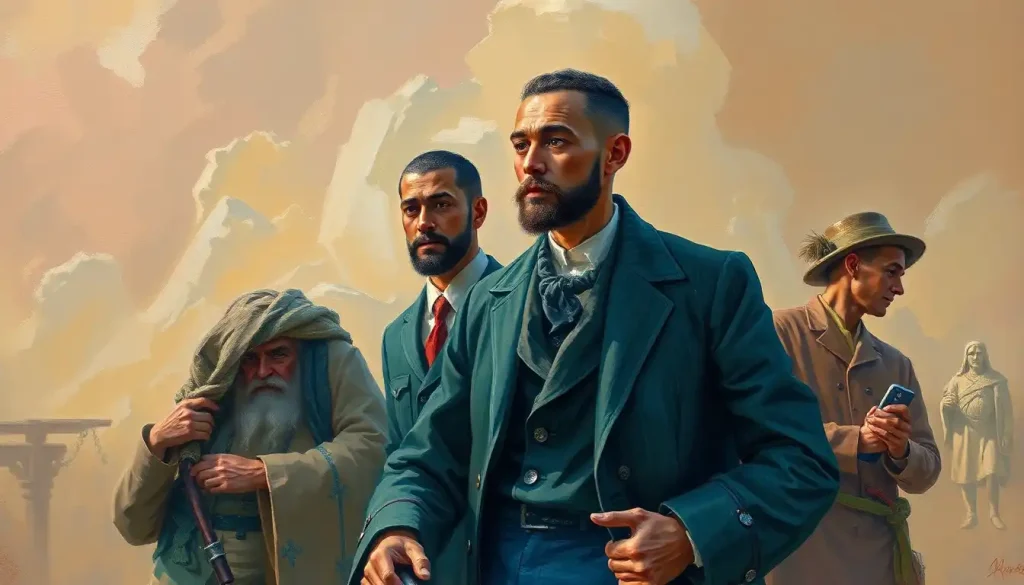From rags to riches, garages to boardrooms, the stories of business visionaries captivate our imagination and ignite the entrepreneurial spirit within us all. These tales of triumph over adversity, innovation in the face of skepticism, and unwavering determination in pursuit of a dream have the power to inspire, educate, and motivate. They remind us that success is not reserved for the privileged few, but attainable for those willing to take risks, learn from failures, and persevere against all odds.
But what exactly is an entrepreneur? At its core, entrepreneurship is about identifying opportunities, taking calculated risks, and creating value where none existed before. An entrepreneur is someone who dares to challenge the status quo, who sees potential where others see obstacles, and who has the courage to turn their vision into reality. They are the dreamers and the doers, the innovators and the disruptors who shape our world and drive progress forward.
The Power of Entrepreneurial Stories
Why do entrepreneur biographies matter? Well, let me ask you this: have you ever felt stuck in a rut, wondering if there’s more to life than the 9-to-5 grind? Have you ever had a brilliant idea but lacked the confidence to pursue it? If so, you’re not alone. And that’s where entrepreneur stories: inspiring tales of innovation, perseverance, and success come in.
These narratives serve as beacons of hope and roadmaps to success. They show us that even the most successful business titans started somewhere, often from humble beginnings. They reveal the struggles, the setbacks, and the moments of doubt that every entrepreneur faces. But more importantly, they demonstrate how these challenges can be overcome with grit, creativity, and an unwavering belief in one’s vision.
In this article, we’ll dive deep into the world of entrepreneur biographies. We’ll explore the key elements that make these stories so compelling, examine the lives of some of the most influential business leaders of our time, and uncover the common traits that set successful entrepreneurs apart. So buckle up, because we’re about to embark on a journey through the highs and lows, the triumphs and tribulations of some of the most inspiring entrepreneurial journeys in history.
Peeling Back the Layers: Key Elements of an Entrepreneur Biography
Every great entrepreneur biography is like a carefully crafted tapestry, woven from various threads that come together to form a compelling narrative. Let’s unravel these threads and examine the key elements that make these stories so captivating.
First up, we have the early life and influences. This is where we get a glimpse into the formative years that shaped the entrepreneur’s worldview. Maybe it’s a childhood spent tinkering with gadgets in the garage, or perhaps it’s the influence of a particularly inspiring teacher or mentor. These early experiences often plant the seeds of future success.
Take, for example, the story of Oprah Winfrey. Born into poverty in rural Mississippi, Oprah’s early life was marked by hardship and adversity. But it was also during these years that she developed the resilience, empathy, and communication skills that would later make her a media powerhouse. Her grandmother’s encouragement to read and speak publicly laid the foundation for her future career in broadcasting.
Next, we delve into the educational background. Now, here’s where things get interesting. While some entrepreneurs boast Ivy League degrees, others are college dropouts or entirely self-taught. The key takeaway? There’s no one-size-fits-all path to success.
Consider the contrasting educational journeys of Bill Gates and Steve Jobs. Gates was a Harvard dropout, while Jobs briefly attended Reed College before dropping out. Yet both went on to revolutionize the tech industry in their own unique ways. It’s not about where you study, but what you learn and how you apply that knowledge.
Then comes the juicy part – the first business ventures. This is where we see the entrepreneur’s ideas start to take shape, often in unexpected ways. It’s a time of trial and error, of learning on the job, and of laying the groundwork for future success.
Entrepreneur examples: inspiring stories of business innovators and visionaries often highlight these early ventures as crucial learning experiences. Take Richard Branson, for instance. His first business venture was a student magazine he started at the age of 16. While it wasn’t a massive financial success, it taught him valuable lessons about publishing, advertising, and managing a team – skills that would prove invaluable in his later ventures.
Of course, no entrepreneurial journey is complete without its fair share of major successes and failures. These pivotal moments often define an entrepreneur’s career and reveal their true character. It’s easy to celebrate the wins, but how an entrepreneur handles setbacks and learns from failures is equally, if not more, important.
Elon Musk’s journey with Tesla is a prime example. The company faced numerous challenges in its early years, from production delays to financial struggles. There were times when Tesla was on the brink of bankruptcy. But Musk’s unwavering belief in the potential of electric vehicles, coupled with his ability to learn from mistakes and pivot when necessary, ultimately led to Tesla becoming the most valuable car company in the world.
Finally, we come to personal and professional growth. This is where we see the entrepreneur evolve not just as a business leader, but as a person. It’s about the lessons learned, the relationships formed, and the values that guide their decisions.
Titans of Industry: Notable Entrepreneur Biographies
Now that we’ve dissected the key elements of an entrepreneur biography, let’s turn our attention to some of the most compelling entrepreneurial stories of our time. These individuals have not only built successful businesses but have also left an indelible mark on our society and culture.
Let’s start with the late Steve Jobs, co-founder of Apple Inc. Jobs’ story is the stuff of legend – a college dropout who started a company in his parents’ garage and went on to revolutionize multiple industries. But what makes Jobs’ story truly captivating is his relentless pursuit of perfection, his ability to envision products that consumers didn’t even know they wanted, and his dramatic comeback after being ousted from the company he founded.
Jobs’ biography is a masterclass in innovation, design thinking, and the power of storytelling in business. It’s also a stark reminder that success often comes at a price, as Jobs’ single-minded focus on his work sometimes came at the expense of personal relationships.
Next up, we have Oprah Winfrey, a media mogul who built an empire on the power of authenticity and connection. Oprah’s journey from a troubled childhood in rural Mississippi to becoming North America’s first Black multi-billionaire is nothing short of inspirational.
What sets Oprah’s story apart is her ability to turn adversity into advantage. She used her own experiences of poverty, abuse, and discrimination to connect with her audience on a deeply personal level. Her biography teaches us about the power of empathy, the importance of staying true to oneself, and the impact one person can have when they use their platform for good.
Then there’s Elon Musk, the enigmatic entrepreneur behind Tesla, SpaceX, and numerous other ventures. Musk’s story is one of audacious goals and relentless drive. From his early days as a co-founder of PayPal to his current efforts to revolutionize transportation both on Earth and in space, Musk’s journey embodies the spirit of innovation and risk-taking that defines entrepreneurship.
What’s particularly fascinating about Musk’s biography is his ability to operate in multiple industries simultaneously. His story challenges the conventional wisdom that entrepreneurs should focus on one thing and do it well. Instead, Musk shows us that with enough passion, intelligence, and work ethic, it’s possible to disrupt multiple industries at once.
Inspiring entrepreneurs: success stories and lessons from trailblazing business leaders often include figures like Sara Blakely, the founder of Spanx. Blakely’s journey from selling fax machines door-to-door to becoming the youngest self-made female billionaire is a testament to the power of perseverance and thinking outside the box.
Blakely’s story is particularly inspiring for aspiring female entrepreneurs. She navigated a male-dominated business world, overcame numerous rejections, and built a global brand with no outside investment. Her biography teaches valuable lessons about trusting your instincts, embracing failure as a learning opportunity, and the importance of solving real problems for consumers.
Last but certainly not least, we have Richard Branson, the flamboyant founder of the Virgin Group. Branson’s biography reads like an adventure novel, filled with daring business moves, world record attempts, and a healthy dose of fun.
What makes Branson’s story unique is his approach to business. He’s not afraid to enter industries he knows nothing about, relying on his ability to spot opportunities, assemble great teams, and infuse everything he does with the Virgin brand’s irreverent spirit. Branson’s biography teaches us about the power of branding, the importance of company culture, and how to balance ambition with a sense of adventure and fun.
The DNA of Success: Common Traits Among Entrepreneurs
As we delve into these inspiring stories, certain patterns begin to emerge. While each entrepreneur’s journey is unique, there are common traits that seem to pop up time and time again. Let’s explore these characteristics that form the DNA of entrepreneurial success.
First and foremost, resilience and perseverance stand out as crucial traits. The road to success is rarely smooth, and every entrepreneur faces setbacks and failures along the way. What sets successful entrepreneurs apart is their ability to bounce back from these setbacks, learn from their mistakes, and keep pushing forward.
Take J.K. Rowling, for instance. Before Harry Potter became a global phenomenon, Rowling faced numerous rejections from publishers. She was a single mother living on welfare, writing in cafes because she couldn’t afford to heat her apartment. But she persevered, believing in her story and her abilities. Her journey from struggling writer to one of the world’s most successful authors is a powerful testament to the importance of resilience.
Innovation and creativity are also key traits shared by successful entrepreneurs. These visionaries have the ability to see opportunities where others see obstacles, to imagine solutions to problems that others haven’t even recognized yet.
Entrepreneur people: inspiring examples and success stories from around the world often highlight figures like Jeff Bezos, who revolutionized retail with Amazon. Bezos’ innovative approach to e-commerce, from the introduction of customer reviews to the development of Amazon Prime, has consistently pushed the boundaries of what’s possible in online retail.
Risk-taking ability is another crucial trait. Entrepreneurs often have to make decisions with incomplete information, betting on their vision and instincts. This doesn’t mean reckless gambling, but rather calculated risks based on careful analysis and a willingness to step out of one’s comfort zone.
Consider the story of Reed Hastings, co-founder of Netflix. When Hastings decided to shift Netflix’s focus from DVD rentals to streaming, it was a huge risk. At the time, internet speeds were still relatively slow, and the concept of streaming movies was largely untested. But Hastings saw the potential of streaming technology and was willing to bet the company’s future on it. This risky move ultimately paid off, transforming Netflix into a global entertainment powerhouse.
Leadership skills are also crucial for entrepreneurial success. As a business grows, the ability to inspire and manage teams becomes increasingly important. Great entrepreneurs are often great leaders, capable of communicating their vision, motivating their teams, and making tough decisions when necessary.
Howard Schultz, the former CEO of Starbucks, is a prime example of entrepreneurial leadership. Schultz didn’t found Starbucks, but he took a small Seattle coffee shop and turned it into a global brand. His leadership style, which emphasized treating employees (or “partners” as Starbucks calls them) with respect and providing benefits like health insurance and stock options, helped create a strong company culture that fueled Starbucks’ growth.
Finally, adaptability and continuous learning are traits that keep entrepreneurs relevant in an ever-changing business landscape. The most successful entrepreneurs never stop learning, always staying curious and open to new ideas.
Entrepreneurial success stories: inspiring examples of modern business pioneers often highlight this trait. Take Mark Zuckerberg, for instance. While Facebook started as a simple social networking site for college students, Zuckerberg has continually evolved the platform, expanding into new areas like messaging, virtual reality, and cryptocurrency. His willingness to learn and adapt has kept Facebook (now Meta) at the forefront of the tech industry.
The Ripple Effect: The Impact of Entrepreneur Biographies
Now that we’ve explored the common traits of successful entrepreneurs, let’s consider the broader impact of these inspiring stories. Entrepreneur biographies do more than just entertain; they have the power to shape mindsets, influence business practices, and even drive societal change.
First and foremost, these stories serve as a wellspring of inspiration for aspiring entrepreneurs. They show that success is possible, even in the face of seemingly insurmountable obstacles. For someone with a dream but lacking in confidence or resources, reading about how Steve Jobs started Apple in a garage or how Oprah Winfrey overcame a difficult childhood to build a media empire can provide the motivation to take that first step.
Entrepreneur success stories: inspiring journeys of innovation and perseverance also offer valuable lessons in business strategy and management. They provide real-world case studies of what works (and what doesn’t) in building and scaling a business. From Jeff Bezos’ customer-centric approach at Amazon to Richard Branson’s emphasis on company culture at Virgin, these stories offer a wealth of insights that can be applied across various industries and business models.
Moreover, entrepreneur biographies often provide unique insights into industry trends and disruptions. They give us a front-row seat to how visionaries identify emerging opportunities and navigate rapidly changing markets. For instance, Elon Musk’s biography doesn’t just tell the story of Tesla and SpaceX; it also offers a glimpse into the future of electric vehicles, renewable energy, and space exploration.
Perhaps most importantly, these stories help us understand the entrepreneurial mindset. They reveal the thought processes, decision-making strategies, and problem-solving approaches that drive successful entrepreneurs. This insight is invaluable not just for aspiring business owners, but for anyone looking to cultivate innovation and leadership skills in their professional life.
Crafting the Narrative: How to Write an Effective Entrepreneur Biography
Given the significant impact of entrepreneur biographies, it’s worth considering what goes into crafting these compelling narratives. Whether you’re a budding biographer or simply curious about the process, here are some key elements to keep in mind when writing an effective entrepreneur biography.
First and foremost, thorough research and fact-checking are crucial. A good biography is built on a foundation of accurate information. This means digging deep into public records, conducting interviews with the subject (if possible) and those who know them, and cross-referencing multiple sources to ensure accuracy.
Balancing personal and professional details is another key aspect. While the focus is often on business achievements, it’s the personal details that make the story relatable and human. Did the entrepreneur have a childhood experience that shaped their worldview? How do they balance work and family life? These personal touches can make the biography more engaging and provide context for the entrepreneur’s decisions and motivations.
Highlighting key business milestones is, of course, essential. These are the turning points that define the entrepreneur’s journey – the launch of a groundbreaking product, a crucial pivot in business strategy, or the decision to take the company public. However, it’s important to go beyond just listing achievements. The most compelling biographies delve into the thinking behind these decisions, the challenges faced, and the lessons learned.
Incorporating quotes and anecdotes can bring the story to life. Direct quotes from the entrepreneur or those who know them well can provide unique insights and add authenticity to the narrative. Anecdotes, whether they’re about a pivotal meeting, a moment of inspiration, or a humorous mishap, can make the story more memorable and relatable.
Finally, crafting a compelling narrative arc is what ties everything together. A good entrepreneur biography isn’t just a chronological list of events; it’s a story with a beginning, middle, and end. It should have tension, conflict, and resolution. It should show the entrepreneur’s growth and evolution over time.
The Lasting Legacy of Entrepreneurial Journeys
As we wrap up our exploration of entrepreneur biographies, it’s clear that these stories hold enduring value. They serve as time capsules of innovation, preserving the ideas, struggles, and triumphs that have shaped our business landscape. They offer roadmaps for aspiring entrepreneurs, providing both inspiration and practical guidance. And they give us all a glimpse into the minds of those who dare to dream big and work tirelessly to turn those dreams into reality.
Best entrepreneur biographies: inspiring stories of business titans continue to captivate readers around the world, and for good reason. In a world that’s constantly changing, where new challenges and opportunities arise every day, the lessons from these entrepreneurial journeys remain relevant and powerful.
So, I encourage you to dive deeper into these stories. Read about the entrepreneurs who inspire you, whether they’re tech visionaries, social entrepreneurs, or innovators in your specific field of interest. Study their successes, learn from their failures, and let their journeys fuel your own ambitions.
Remember, every great entrepreneur started somewhere. They faced doubts, overcame obstacles, and persevered in the face of setbacks. Their stories remind us that with passion, perseverance, and a willingness to take risks, extraordinary things are possible.
Who knows? Maybe one day, your entrepreneurial journey will be the one inspiring future generations. So dream big, work hard, and write your own success story. The world is waiting for the next great entrepreneur. Could it be you?
References:
1. Isaacson, W. (2011). Steve Jobs. Simon & Schuster.
2. Branson, R. (2011). Losing My Virginity: How I Survived, Had Fun, and Made a Fortune Doing Business My Way. Crown Business.
3. Vance, A. (2015). Elon Musk: Tesla, SpaceX, and the Quest for a Fantastic Future. Ecco.
4. Schultz, H. (2011). Onward: How Starbucks Fought for Its Life without Losing Its Soul. Rodale Books.
5. Blakely, S. (2022). The Wind at My Back: Resilience, Grace, and Other Gifts from My Mentor, Reba McEntire. Worthy Books.
6. Stone, B. (2013). The Everything Store: Jeff Bezos and the Age of Amazon. Little, Brown and Company.
7. Winfrey, O. (2014). What I Know For Sure. Flatiron Books.
8. Rowling, J.K. (2020). Very Good Lives: The Fringe Benefits of Failure and the Importance of Imagination. Little, Brown and Company.
9. Hastings, R. & Meyer, E. (2020). No Rules Rules: Netflix and the Culture of Reinvention. Penguin Press.
10. Zuckerberg, M. (2021). The Facebook Era: Tapping Online Social Networks to Market, Sell, and Innovate. Pearson FT Press.












Would you like to add any comments? (optional)